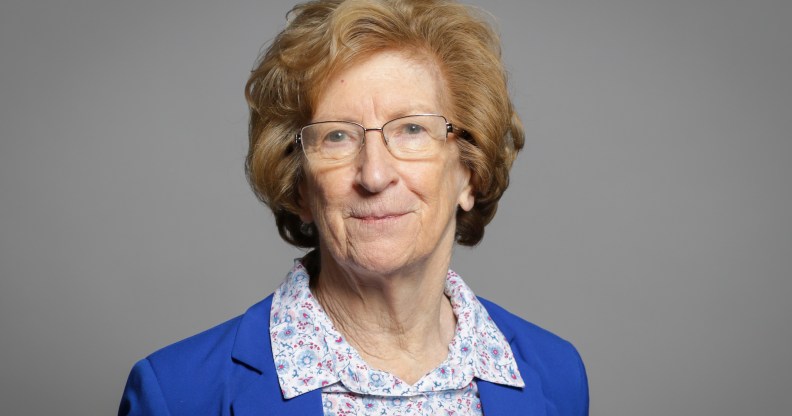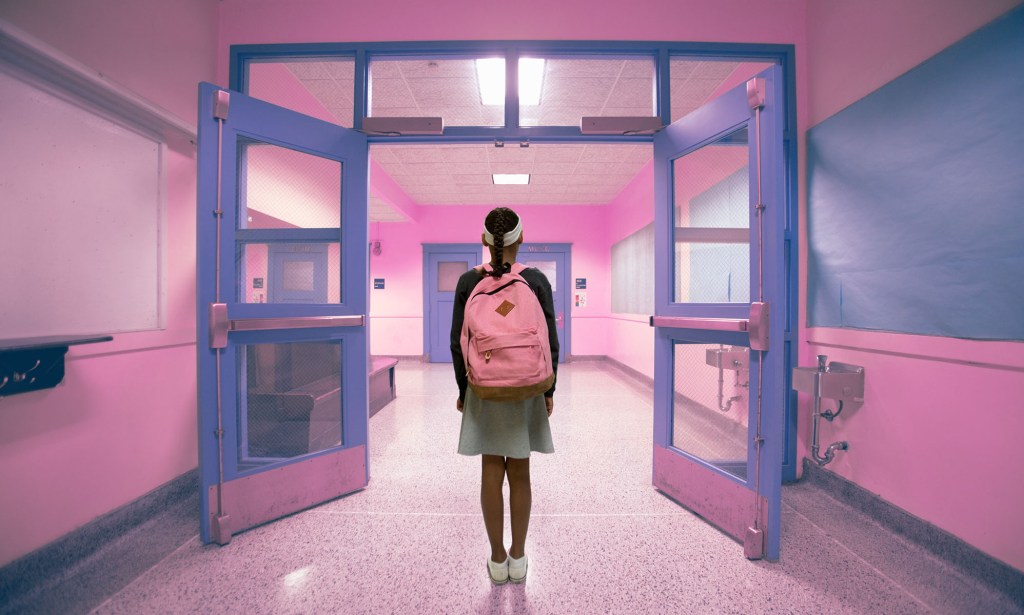Peer says trans youth should be discouraged from transitioning ‘until their late twenties’

Baroness Molly Meacher spoke during a House of Lords debate on schools guidance for gender-question children. (UK Parliament)
A cross-bench life peer has suggested young trans people should be discouraged from transitioning until they are in their late twenties.
During a House of Lords debate about gender-questioning children in schools on Thursday (22 February), peers posed questions to the parliamentary under-secretary of state for the school system, Baroness Diana Barran, on topics including the non-statutory guidance for schools on supporting trans kids and LGBTQ+ organisations’ opposition to it.
The government’s long-delayed trans guidance for schools in England was finally released in December, with the aim of providing information to school staff on how to approach a range of issues related to transgender youngsters, including pupils socially transitioning, access to single-sex spaces and admissions to single-sex schools and sport.
One area the 20-page non-statutory guidance touched on in-depth was social transitioning – whereby someone changes their name, presentation and pronouns – describing it as not a “neutral act” and urging schools to take a “cautious approach”.
During the debate on Thursday, cross-bench peer Baroness Molly Meacher asked if Barran agreed that “schools must strongly discourage school-age children from taking any steps towards gender transition until their late twenties, by which time the decision-making part of their brain – the prefrontal cortex – will be fully developed.”
Barran replied: “The guidance is very clear that each case should be taken individually. The safety and well-being of children must always be our primary concern, which is why that is at the heart of the guidance.
“Some of the medical steps… are implicit in that safety and well-being focus.”

Some peers took the opportunity to attack LGBTQ+ charities such as Stonewall and Mermaids, which have expressed opposition to the guidance and have labelled it “chilling” and “actively dangerous”.
Baroness Claire Fox, a former Brexit Party MEP, asked if Barran found it “troubling” that since the guidance was published, “a variety of lobby groups and commercial providers are targeting school [senior leadership teams], advising them to ignore and even resist [it]”.
She also asked if the Department for Education would “counter misinformation, circulated by the likes of Mermaids, Just Like Us, Stonewall, The Key and even trade unions, that wrongfully alleges the guidance is in breach of equality law, discriminatory and transphobic” and if Baroness Barran would condemn “attempts to scare teaching staff by suggesting that following the guidance puts them at risk of action by regulators and litigators”.
Barran responded: “Schools are expected to consider all the guidance from the department, and this is no exception. We would expect them to follow the final published guidance. I looked at some of the campaigns being run and some of the templates that charities have published.
“I share the concern that they are quite oppositional in tone and are pitting parents against schools, which the guidance explicitly tries to avoid.”

A similar perspective was shared by Conservative peer Baroness Olivia Bloomfield, who asked the minister to “join [her] in condemning” Mermaids going into primary schools to speak to children about trans identities.
“This is inappropriate for four year-olds,” Bloomfield, a former governor at the private girls’ school Cheltenham Ladies’ College, said, citing her own grandchild as an example.
“I absolutely agree,” Barran replied. “Again, the guidance is clear that schools should not agree to support any degree of social transition for a primary-school child unless it is explicitly required to safeguard and promote their welfare.”
However, Labour peer Baroness Fiona Twycross, a former member of the London Assembly’s education panel, who has “two honorary nieces who are trans”, said she found the “tone of the debate often ignores the fact that this is about individuals and how we treat them” and asked the minister to confirm “dignity and respect” were at the heart of the guidance.
“It is absolutely clear that schools and colleges should be respectful and tolerant places where bullying is never tolerated,” Barron said.
The non-statutory guidance is undergoing a 12-week consultation period, until 12 March, during which parents, teachers and school staff are encouraged to respond.
Education secretary Gillian Keegan said at the time of its publication: “This guidance puts the best interests of all children first, removing any confusion about the protections that must be in place for biological sex and single-sex spaces, and making clear that safety and safeguarding for all children must always be schools’ primary concern.
“Parents’ views must also be at the heart of all decisions made about their children, and nowhere is that more important than with decisions that can have significant effects on a child’s life for years to come.”
Update 24/02/2024, 14.07: An early version of this article incorrectly stated that Baroness Molly Meacher is a Conservative peer. She is in fact a cross-bench peer.
How did this story make you feel?

